Topics
- Article
Recap: WHOOP Athletes in Rio 2016

The Rio Olympics have come to a close. A memorable close, at that.
Four years ago, the London Olympic rings were lowered after a successful two weeks of competition, and now the same has happened in Rio. A full quadrennial of preparation took center stage with lightning fast swimming performances, mesmerizing moves on the mat, and second chances on the track that left the world sitting on the edge of their seats, wanting more.
In the middle of these successes, we’re honored to say that WHOOP played a significant role in helping 29 members from Team USA, Great Britain, Australia, Serbia, and the Netherlands achieve peak performance. In total, WHOOP athletes earned 7 gold medals, 4 silver medals, and 1 bronze medal. These medals spanned the pool, the track, and the waters of Rodrigo de Freitas Lagoon. With every WHOOP athlete that won, our office in Boston was watching live from 4,845 miles away.

In honor of the conclusion of the games, we’re taking a look back at four WHOOP medal winners who all achieved peak performance during their competition. In this post, we’re highlighting USA singles sculls rower Gevvie Stone, USA basketball player Kyle Lowry, USA distance swimmer Connor Jaeger, and USA Women’s eight rower Meghan Musnicki.
Gevvie Stone,
This was Gevvie Stone’s last professional race, and she went out with a bang. Now that Rio is complete, Gevvie is applying to residency to become an orthopedic surgeon. After just finishing her second Olympic games and standing on the podium, Gevvie is now pursuing a career as a doctor. No rest for the weary, huh?

Gevvie mastered the choppy Rio course of the women’s single sculls, cruising into second and winning her first Olympic medal – a silver.
“It’s funny because people think that silver medalists are unhappy because they didn’t get gold,” said Stone to Team USA. “I’m so happy. I could not be happier. Kimmie (the gold medalist) has been on the top and to be that close to her and get the silver medal, it’s amazing.”
During Gevvie’s A Final race, the waters were choppy – quite choppy, in fact. For most of the racers this level of chop was unfamiliar, but luckily for Gevvie, it felt like home. Hailing from Boston and training on the rough Charles River, this otherwise unpleasant course was a dream for Gevvie and her coach.
“I could feel everyone else struggling a little bit, and I was like, ‘Yes, this is Boston. This is what I want. This is rough water.’”
Gevvie used her 7th place finish in the London games as motivation to fuel her training. It was a gutsy performance. If you saw it, you know what I mean. If you didn’t, just imagine competing in an all-out sprint for 2,000 meters – or 1.24 miles – and then leaving it all on the line, knowing this was the final race of your career. Not only does that take strength and stamina, but it also requires mental and emotional toughness.
Leading up to her performance, Gevvie’s Recovery had an impressive uptick throughout her time in Rio. Three weeks before Gevvie’s August 13th silver medal race, she had an average Recovery of 68. Not bad for an athlete who is preparing for the Olympics. When comparing this average to Gevvie’s July average of 57, you can see that she prioritized Recovery as Rio approached. That means more sleep in conjunction with balanced Strain.
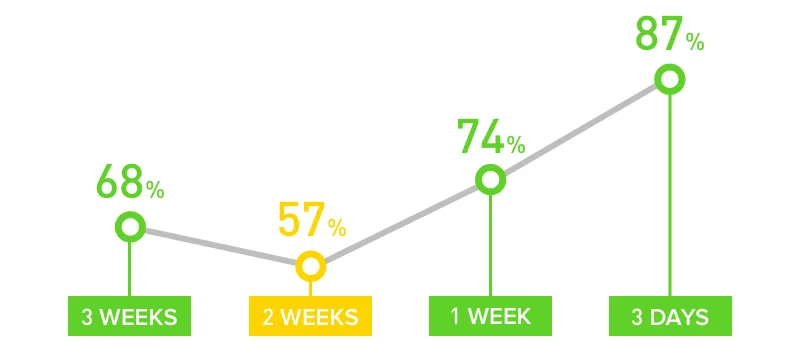
Then, 2 weeks before her final race, Gevvie’s average Recovery dropped to 57. It’s only reasonable to believe that traveling and preparation for Rio had an effect on this change. It’s not necessarily significant, but worth noting. Then, one week before her final race, her average Recovery climbed to 74 and continued to improve to an average of 87 as she was three days before her final race.
This upward trend and dedication to Sleep and Recovery helped Gevvie find peak performance in Rio – resulting in a silver medal.
Kyle Lowry,
We’ve seen this storyline before. The expectation of goliath – who is heavily favored to blowout David – showing signs of faltering as the pressure rises. At the end of the first quarter of the USA Men’s Basketball final, I felt the gold medal game was up for grabs, and this traditional sports storyline was coming to fruition. Then everything changed. Team USA went on a 40-15 run and took over the lead.
What happened?
The bench took over.
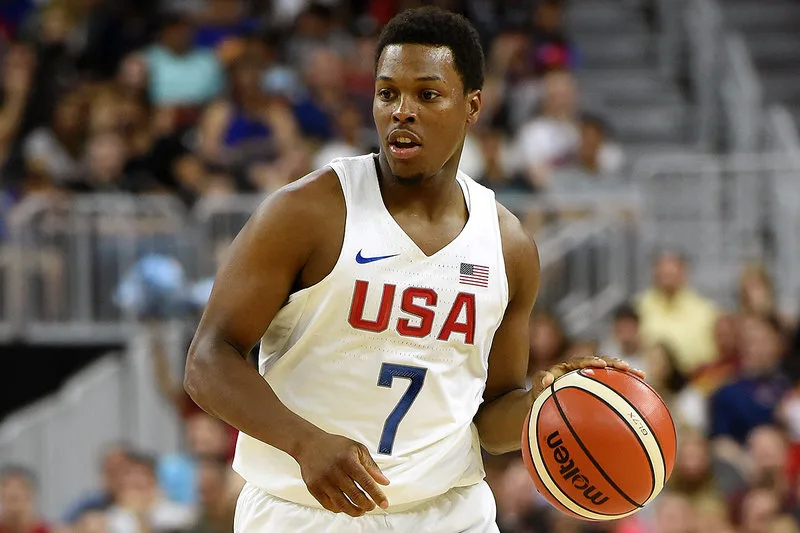
Lead by Kyle Lowry and Paul George, the bench brought a more gritty, tenacious style of play that moved the ball up court, and opened up opportunities for Kevin Durant to take over. When the starters occasionally struggled, the bench came in and implemented a tough attitude that changed the game pace. Kyle played a huge role in Team USA’s success as he brought on a steadfast defensive style to the game. At the end, Olympic assistant coach, Jim Boeheim called Kyle Lowry, “The best player out of everybody.”
“He just really bought in and was a great leader and gave everything he had every time he went out there,” explained Boeheim. “That was important for our team.”
Kyle played 22 minutes, had 5 rebounds, 5 assists, 5 points, and 2 steals. However, his numbers in that game were not the reason Boeheim made that statement. Rather, it was Kyle’s tempo and attitude. We’ve seen this same grit before in the NBA Eastern Conference Finals as a player who nearly single-handedly dethroned Cleveland.
“He was our unsung hero,” Coach K said about Lowry. “He ended up being incredibly valuable, on and off the court.”
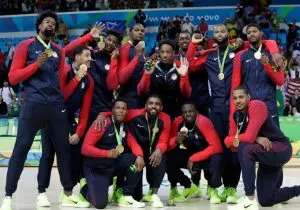
Connor Jaeger,
The drought has been lifted and a rare medal for Team USA has been won.
Connor Jaeger is the first American to medal in this event since Larsen Jensen in the 2004 Athens games. He took control of silver half-way through the 1500 meter freestyle, and in the process, ended up breaking his own American record.
“I watched USA really crush it this week,” Connor said. “It was time for me to hold up my end of the bargain. I wanted to contribute to the medal count. I was thinking about it the whole time.”
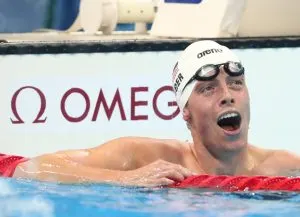
In the final race of his last Olympic meet, Jaeger swam a very methodical and strategic swim which he had, in my eyes, secured from the second he dove in. Never once did he panic when Italy’s Gregorio Paltrinieri stormed to the lead.
Paltrinieri, the gold medal winner, flirted with the world record early in the race but slowed at the end.
“Gregorio really took off,” said Jaeger. “You just don’t know what’s happening. Am I going slow? Thankfully, he was just going really fast. It was comforting to know no one else went with him. To kind of remain in the pack and have him go do his own thing, it allowed me to stick to my race strategy.”
“I just went into this race saying crazier things have happened than me medaling in this race,” Jaeger told NBC. “I really couldn’t have looked for a better source of inspiration than my teammates this whole week.”

As with Gevvie and Kyle, we’re honored to have helped Connor understand his Recovery patterns so that he could predict peak performance leading into the Rio Olympics.
Meghan Musnicki,
It’s a great feeling when success comes full circle. This year Meghan Musnicki draped yet another gold medal around her neck. Meghan helped Team USA to its third straight Women’s Eight Olympic gold medal.
The Women’s Eight rowing team may be one of the most prolific teams on Team USA for their continued dominance on the water. They have won eight world championships and three Olympic titles, resulting in an undefeated record in major international competitions over that last 11 years. Meghan has been the continual team-centerpiece of what they’re now dubbing, “the Decade of Dominance.”
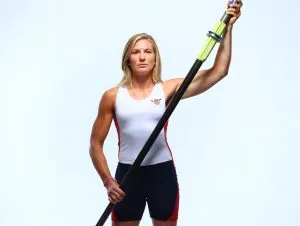
The gold medal race was a spectacle. Racing on the finally-calm waters of Lagoa Rodrigo de Freital, Team USA started off the first 1,000 meters in third place. Then, after a few strategic moves at the 1,500-meter mark, they turned on the jets extending their lead over the second-place Canadian team by 1.72 seconds. This positioned Team USA to then close in on Great Britain who was in first. By the time they crossed the finish line they had an entire boat lead over Great Britain, proving USA’s “dominance” and closing speed.
“It was an indescribable feeling the entire way down, you could feel all nine of us fighting to push our bow ball forward,” said two-time Olympian Meghan Musnicki to Team USA reporters. “It was our goal to stay very internal because we knew it was going to be a tight race.”
Even though this team has been called a dynasty, Meghan points out that the legacy belongs to the U.S. boat, not the particular women rowing it.
“It’s easy for the outside to look in and say this team has won X number of years in a row,” Meghan said. “While it’s true that the U.S. team has, this was our second race together as a team. So this boat of nine has only won once before, in the previous heat.”
The tradition that has carried over from year to year is not the talent in the boat, but the willingness to commit themselves to their teammates and the tradition of becoming better as a rowing unit. In doing so, they’ve created one of the most iconic stories in sports – the “Decade of Dominance.”
